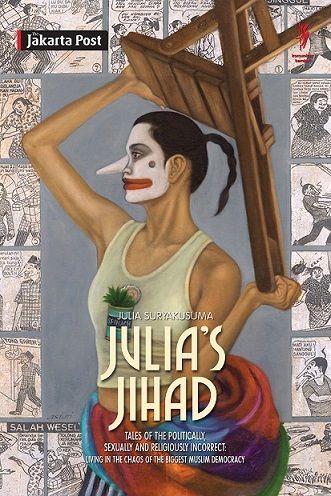The provocative Julia Suryakusuma on the rampage
If Australia has been blessed with excellent cartoonists, Indonesia has been similarly blessed with excellent columnists. Thanks to Jennifer Lindsay’s translations, English-speaking readers outside Indonesia can appreciate Goenawan Mohamad’s ‘Catatan Pinggir’ (Sidelines) columns from Tempo magazine.
Julia Suryakusuma, well-known as Indonesia’s most provocative columnist, needs no translator. Julia’s Jihad is a selection of more than a hundred of her columns published between 2006 and 2013. Most made their first appearance as her Wednesday column in the English-language The Jakarta Post (‘Julia’s WC’). Others come from the English language edition of the weekly Tempo.
Sri Astari’s marvellous painting, ‘Flying Chair’, on the cover beautifully matches the iconoclasm of the author. It portrays a female version of the wayang figure Petruk brandishing a folding wooden chair, poised to overturn it or hurl it at her target of the day. Julia identifies herself with this feisty incarnation of the punakawan who is licensed to criticise the powers that be in an entertaining way.
While on the subject of illustration, we should note that the book is graced by 30 cartoons drawn by Julia’s Australian husband Tim Lindsey, who also makes a cameo appearance in several of her columns.
The title of the book is itself a provocation both to Islamist extremists and Islamophobes. The author is a liberal feminist Muslim who has chosen this title with serious purpose - not just for alliteration. She wants to recover the meaning of the word jihad from prevalent connotations of armed warfare and terrorism. For her, the original meaning of jihad in Islam is ‘spiritual struggle’ in its widest sense. It gives her and fellow Muslims not just the freedom but the obligation to seek justice and truth and to try to create a better society that is free of poverty, injustice and corruption. An Islamic praxis, so to speak.
There is nothing pompous or stuffy in the way she goes about it. Take what may be the world’s longest book subtitle: ‘Tales of the Politically, Sexually and Religiously Incorrect: Living in the Chaos of the Biggest Muslim Democracy’. We have been warned, and there is never any doubt where she is coming from. She is a democrat, a feminist, and a Muslim. She is also funny.
There is much to enjoy in this collection. For a sampling of columns taken from the daily or weekly press, it is remarkably free from ephemera that require contextualisation. Historians will nevertheless appreciate the chronological organisation of the book and the provision of the date and place of original publication of each column.
It is, of course, a book to sample and savour, rather than to read right through in one sitting. The columns run the gamut from the quiddity of everyday life in Jakarta to biting criticism of corruption by those in power. Non-Muslims will learn much from this intelligent and broad-minded Muslim woman about Islam and life in general. Indonesian and foreigner alike can enjoy her mixture of irreverence and political intent.
Different readers will necessarily have their own favourites. One of mine is ‘My Big Fat Jakarta Wedding’ (The Jakarta Post, 4 October 2006, but mistakenly labelled 6 September 2006 in the book). She opens by saying ‘When Tim and I were married in October last year, we decided on a small wedding – the smallest we could possibly have, in fact, with just seven close family members and three friends’. The decision drew outrage from uninvited friends and relatives in Jakarta where big weddings are the norm in elite circles. This leads her to a splendid rant about the recent obscenely ostentatious wedding of actress Lulu Luciana Tobing to Suharto’s grandson Danny Bimo Hendro Utomo Rukmana. She notes that the former president was well enough to attend the family nuptials but deemed too sick to face up to the court on corruption charges. In another sideswipe she deplores the timing of the wedding celebrations, because they were so close to the anniversary of 30 September 1965, and ‘the start of the killings that Soeharto rode to power and which became the basis for the regime’s continued repression, abrogation of democratic principles, ignoring of human rights and abuse of power in general’.
No topic is taboo for Julia. Take her spirited critique of the use of toilet paper and defence of the Indonesian practice of cebok—the use of water in ablution (‘Papering over the Cracks: a Cheeky Column’, The Jakarta Post, 30 January 2008). The sweep of topics covered in her columns is much too broad to attempt to summarise in a short review like this. Buy the book and enjoy it: there is something there for everyone.
Charles A. Coppel (c.coppel@unimelb.edu.au) is a Principal Fellow in the School of Historical and Philosophical Studies, Senior Associate in the Centre for Indonesian Law, Islam and Society and an Associate in the Asian Law Centre at the University of Melbourne.











